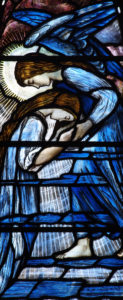I happened to be in the second row. Only a few dozen people usually came to the evening service. The worship music provided a space of solace, quieting the rush of the day. With my eyes closed, I listened, waiting for anything the Holy Spirit might say.
 On the screen of my mind, I saw a woman wearing a large amber-colored stone in the shape of a teardrop. Too heavy to be jewelry, it seemed like a burden around her neck. The image was distinct, but fleeting. After a few seconds, it vanished. Had I really seen something?
On the screen of my mind, I saw a woman wearing a large amber-colored stone in the shape of a teardrop. Too heavy to be jewelry, it seemed like a burden around her neck. The image was distinct, but fleeting. After a few seconds, it vanished. Had I really seen something?
And then a phrase interrupted my thoughts…a weight of deep sorrow.
The music ended, and the pastor asked if God had given any impressions that might encourage everyone. I stalled. Hearing God for others was a new concept to me. After a few people shared, I drew a deep breath and raised my hand. I described the heavy stone and how it seemed more like a yoke than a necklace. My voice sounded shaky.
“And what do you think it represents?” the pastor asked.
“An amber teardrop…the color, the shape—maybe something from the past,” I offered.
 “Something that’s keeping someone in continual sadness…a weight of deep sorrow.”
“Something that’s keeping someone in continual sadness…a weight of deep sorrow.”
The pastor gazed at the people in the rows behind me. “Does that mean anything to anyone?” His tone was kind.
I lowered my head slightly. The room went quiet. Perhaps it had just been my own imagination—making something from nothing. I felt a little foolish. No one responded, and blood rushed to my face. As the service continued, I avoided eye contact.
Several days later, my phone rang. A woman on the other end told me she’d contacted the pastor for my phone number. She sounded timid, her voice barely audible. Her explanation tumbled out in fragments…how she’d been late to the service… how she sat in the back row…and what I said that night about the teardrop stone… Her words broke up. It took a few moments to gather her emotions.
“I couldn’t stop…crying,” she said. “I had to leave.”
I felt a loss of words. Had I offended her? Should I apologize?
 Then she told me something that took my breath away. That night at church, she happened to be wearing an amber teardrop stone around her neck. It lay hidden under the edges of her blouse. Only she knew—and apparently, God.
Then she told me something that took my breath away. That night at church, she happened to be wearing an amber teardrop stone around her neck. It lay hidden under the edges of her blouse. Only she knew—and apparently, God.
Sitting up front, I never saw her come or go.
“I don’t understand…” Her voice vibrated with vulnerability. “How…how did you know?”
I scrambled for words. “I… I really didn’t.” Pausing, I sank down into a chair. “But God does…He knows you.”
The sound of quiet weeping came through the receiver.
 Closing my eyes, I prayed for the right words. “He saw everything that happened,” I continued. “And He doesn’t want you to carry this heavy sorrow anymore.” It felt bold to say such things to someone I didn’t know.
Closing my eyes, I prayed for the right words. “He saw everything that happened,” I continued. “And He doesn’t want you to carry this heavy sorrow anymore.” It felt bold to say such things to someone I didn’t know.
She didn’t speak right away, but I knew she was listening. I could feel her sadness as if we were in the same room. My eyes watered.
“Can you release it to God?”
Another long silence followed. “I…can try.” Her voice seemed calmer. “Thank you,” she whispered.
Then I heard a click. She’d hung up.
I never knew her name, I didn’t know what happened—but I didn’t need to know. God planted a simple impression in my mind and asked me to speak it out in faith.
The Lord God has given Me the tongue of disciples,
That I may know how to sustain the weary one with a word.
He awakens Me morning by morning,
He awakens My ear to listen as a disciple.
The Lord God has opened My ear,
And I was not disobedient, nor did I turn back.
–Isaiah 50:4,5 (NASB)
 In these verses, “Jesus is set forth as…the completely obedient Servant…the tongue of the learned, rather of them that are taught. That is, the Messiah would speak as one to whom God has taught his true message of comfort for those who are weary…”[i]
In these verses, “Jesus is set forth as…the completely obedient Servant…the tongue of the learned, rather of them that are taught. That is, the Messiah would speak as one to whom God has taught his true message of comfort for those who are weary…”[i]
And God wants us to function in that same purpose through the Holy Spirit. It’s a beautiful thing to witness the tenderness of God embracing a brokenhearted person.
 How easily I could’ve remained silent that night, avoiding what might appear presumptuous. I didn’t relish the awkward silence when no one responded. I could’ve kept myself to myself, but I overcame my natural reticence. And every so often, God lets me see the fruit of such a risk, encouraging me to keep an open ear.
How easily I could’ve remained silent that night, avoiding what might appear presumptuous. I didn’t relish the awkward silence when no one responded. I could’ve kept myself to myself, but I overcame my natural reticence. And every so often, God lets me see the fruit of such a risk, encouraging me to keep an open ear.
And though that impression was specifically for her, I was flooded with His love all over again. I, too, felt the visceral impact of God’s intimacy. And I remain utterly rapt with fascination that the God of the universe not only knows us, but also wants to be present in our lives.
__________________________________
[i] The Wycliffe Bible Commentary, Moody Press, Chicago, 1962, pg. 645







